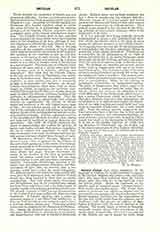

Secular Clergy (Lat. clerus secularis).—In the language of religious the world (saeculum) is opposed to the cloister; religious who follow a rule, especially those who have been ordained, form the regular clergy, while those who live in the world are called the secular clergy. Hence the expression so frequently used in canonical texts: “uterque clerus”, both secular and regular clergy. The secular cleric makes no profession and follows no religious rule, he possesses his own property like laymen, he owes to his bishop canonical obedience, not the renunciation of his own will, which results from the religious vow of obedience; only the practice of celibacy in Holy Orders is identical with the vow of chastity of the religious. The secular clergy, in which the hierarchy essentially resides, always takes precedence of the regular clergy of equal rank; the latter is not essential to the Church nor can it subsist by itself, being dependent on bishops for ordination. (See Cleric; Regulars.)
A. BOUDINHON

